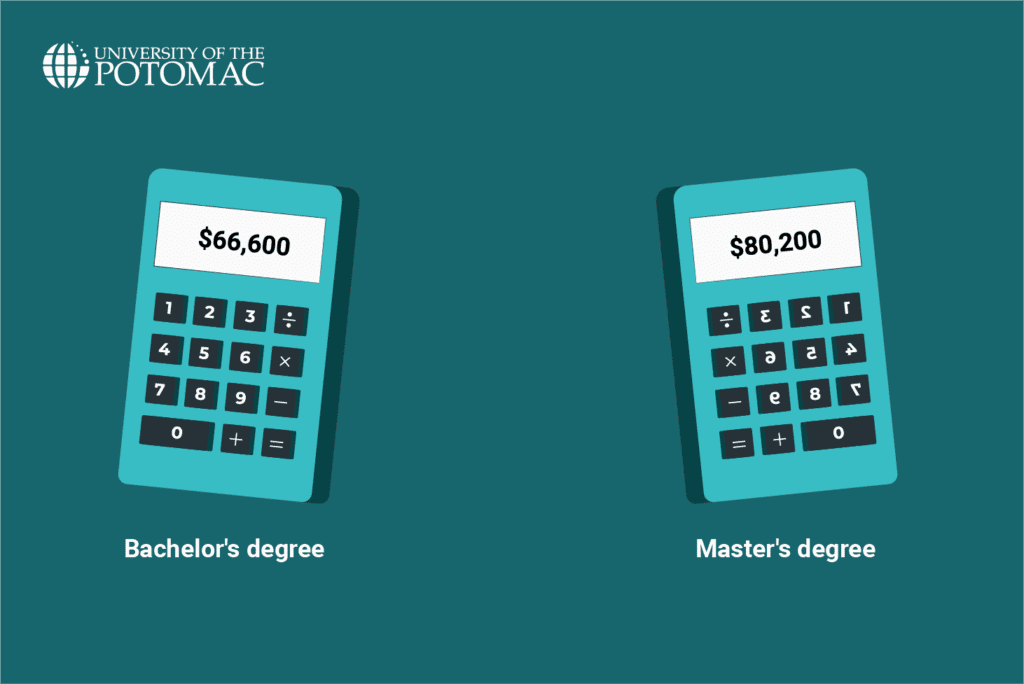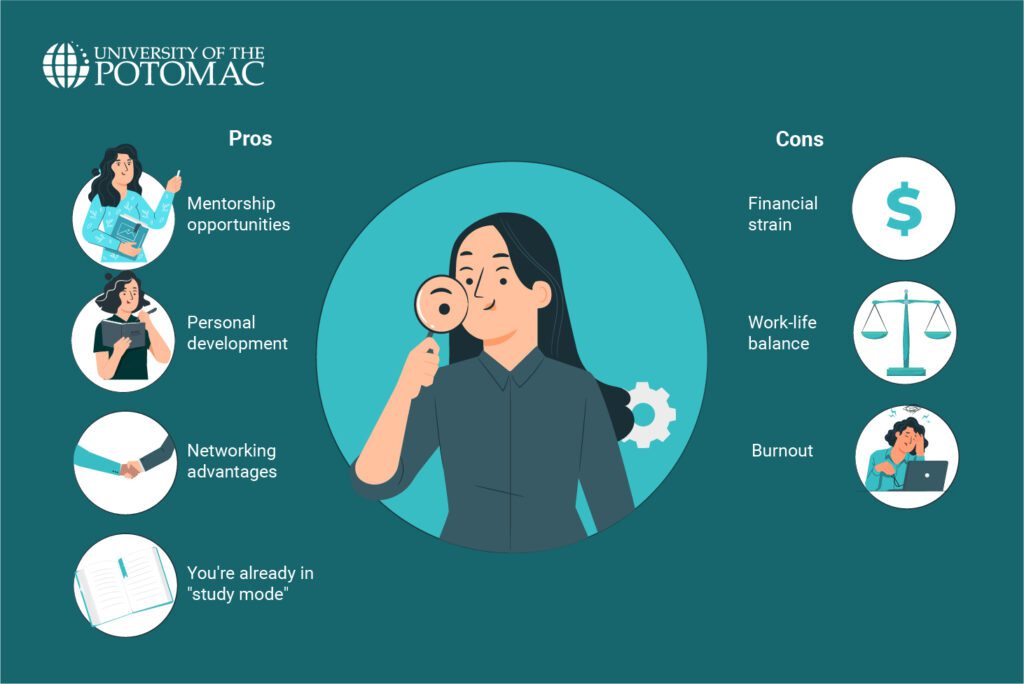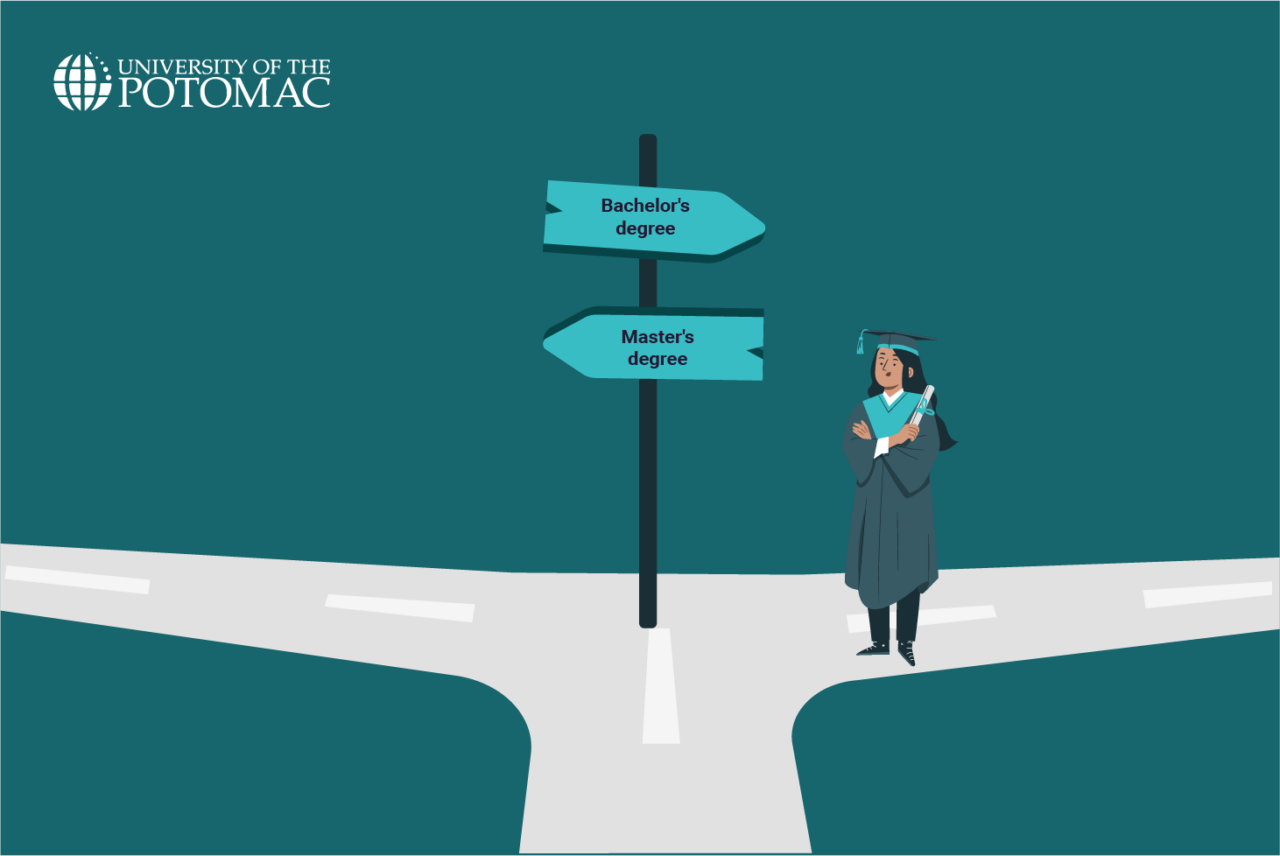Earning either a bachelor’s or master’s degree can help you develop new skills or reach career goals. Continue reading to discover which degree will help you achieve your dreams.
Are you close to wrapping up your undergraduate studies, or have recently graduated from a bachelor’s degree program and are considering what steps you want to take next?
Bachelor’s and master’s degrees can help you develop your skills and expand your knowledge in your field of study. Both credentials can benefit your career, but which one should you choose?
We want you to feel empowered when making a decision about your future. So, join us as we explore whether you should choose a bachelor’s vs. master’s degree and compare salaries and career opportunities.
What Is a Bachelor’s Degree?
A bachelor’s degree is a four-year program in a specific academic discipline. This credential provides a strong foundation in your chosen field of study, acting as a stepping stone for further education. Bachelor’s programs cover core educational elements in a field of study. Besides core courses, you can choose elective courses to expand your knowledge.
There are multiple advantages to earning a bachelor’s degree, including:
- More job opportunities
- Higher earning potential
- Networking opportunities
- A pathway to advancement
Bachelor’s Degrees at Potomac
Here at UOTP, we take pride in our collection of bachelor’s degree programs, each providing a solid foundation for work in that field. We offer the following programs.
- Bachelor of Science in Accounting
- Bachelor of Science in Business
- Bachelor of Science in Cybersecurity
- Bachelor of Science in Computer Science
- Bachelor of Science in Information Business
- Bachelor of Science in Early Childhood Development
- Bachelor of Science in Geospatial Information Technology
- Bachelor of Science in Government Contract Management
- Bachelor of Science in Health Information Management
- Bachelor of Science in Hospitality
- Bachelor of Science in Information Technology
Besides the myriad of bachelor’s degree programs, here at UOTP, you can grow as an individual and enhance your overall perspective of the world. You can meet other students with shared interests and build relationships with professors and recruiters, possibly leading to job interviews. Moreover, you can participate in student organizations and campus events, allowing you to explore your interests and positively contribute to the community.
What Is a Master’s Degree?
A master’s degree is a graduate degree you can pursue after completing a bachelor’s degree. It typically takes one to three years to complete and is more rigorous than a bachelor’s degree program. Because it offers advanced knowledge in a field of study, this credential helps you establish expertise in a field and prepares you to take on more advanced and leadership roles.
There are many reasons to pursue a master’s degree. It can open more job opportunities and increase job security. Earning a master’s degree also gives you more opportunities to conduct research and contribute to your chosen field of study.
Master’s Degrees at Potomac
Here at UOTP, we offer numerous master’s degree programs that combine theory and applied research so you can graduate with highly sought-after skills required in today’s competitive marketplace.
We offer the following master’s degree programs:
- Master of Business Administration (MBA)
- Master of Science in Accounting (MSAC)
- Master of Science in Computer Science (MSCS)
- Master of Science in Data Analytics
- Master of Science in Education
- Master of Healthcare Administration
- Master of Science in Healthcare Informatics
- Master of Science in Information Technology
- Master of Science in Geospatial Information Technology
We also offer online options for our programs, built on a flexible platform to allow you to complete your courses on your schedule. Even our on-campus classes are built around a schedule to accommodate adult students who want to continue their education.
Salary and Career Differences
A bachelor’s and a master’s degree can lead to different earning potentials and open doors to various career opportunities. Let’s compare the potential salaries with a bachelor’s and a master’s degree and what your future can look like with each credential.
Salary Comparison

When deciding whether to choose a bachelor’s or master’s degree, it’s crucial to compare the average salaries associated with each credential. According to the National Center for Education Statistics (NCES), the average salary of bachelor’s degree holders is $66,600, whereas master’s degree holders earn $80,200.
However, these numbers depend on your experience, location, and industry. With your industry significantly influencing your salary, let’s explore some industry-specific wages depending on your degree.
Bachelor’s degree:
- Financial Analyst: $99,010
- Marketing Manager: $166,410
- Project Manager: $104,920
- Database administrator: $104,810
Master’s degree:
- Chief Financial Officer: $203,667
- Senior Product Manager: $147,780
- Human Resources Manager: $136,350
- Cybersecurity Manager: $132,962
- School Principal: $103,460
Career Opportunities
Let’s explore potential career opportunities you can pursue with a bachelor’s and a master’s degree.
Depending on your bachelor’s degree program, career paths you can pursue include:
Interested in pursuing a degree?
Fill out the form and get all admission information you need regarding your chosen program.
This will only take a moment.
Message Received!
Thank you for reaching out to us. We will review your message and get right back to you within 24 hours.
If there is an urgent matter and you need to speak to someone immediately you can call at the following phone number:
- We value your privacy.
- Bachelor’s degree in accounting: Accountant, budget analyst, financial analyst, financial examiner, and personal financial advisor
- Bachelor’s degree in computer science: Software engineer, database administrator, software developer, systems programmer, and systems analyst
- Bachelor’s degree in hospitality: Travel agent, holiday counselor, restaurant manager, food and beverage director, and food service manager
- Bachelor’s degree in information technology: IT specialist, security engineer, database administrator, and computer network architect
On the other hand, career opportunities you can pursue with a master’s degree include:
- Master’s degree in geospatial information technology: GIS analyst, physical analyst, energy analyst, and data manager.
- Master’s degree in business administration: Chief financial officer, investment banker, sales manager, marketing director.
- Master’s degree in healthcare administration: Medical records supervisor, clinical director, and chief executive administrator.
- Master’s degree in information technology: IT risk manager, chief technology officer, computer and information systems manager, and data science manager.
Is It Better to Earn a Master’s Degree Right After a Bachelor’s?

Now, let’s address the big question, “Is it better to earn a master’s degree right after a bachelor’s?” Here are the pros and cons of pursuing a master’s degree right away.
Pros of Pursuing a Master’s Right Away
Some of the reasons why going right into a master’s program after graduation can be beneficial to you include:
- Mentorship opportunities: Many master’s degree programs include internships, guest lectures, and industry-focused seminars as part of the curriculum. These activities can lead to mentorship opportunities, allowing you to gain valuable insights about the industry and potential career paths.
- Personal development: Beyond the professional benefits of a graduate degree, a master’s degree can also lead to personal development and fulfillment. It provides opportunities for self-discovery and intellectual exploration, fostering a sense of accomplishment and satisfaction.
- Networking advantages: A master’s program provides a perfect avenue to build connections with professionals from your industry who have varied backgrounds and experiences. These connections can be with peers, faculty, and industry leaders, which can help you with recommendations and mentorships.
- You’re already in “study mode.” Leaving school and returning years can be rough. Pursuing a master’s degree right after your studies is a great option as you know your way around attending lectures, preparing for exams, and writing essays. This way, the transition to the difficulties of a master’s degree won’t affect you as much.
Cons and Considerations
On the other hand, there are some potential disadvantages to pursuing a master’s right away. They include:
- Financial strain: According to the Education Data Initiative, the average cost of a master’s degree is $59,684, and taking on additional student loans or relying on savings can lead to financial stress.
- Work-life balance: Master’s degree programs have more intensive coursework, which can leave little time for relaxation and hobbies.
- Burnout: While the allure of diving straight into a master’s degree is tempting, the assignments, constant expectations, and the challenge of juggling life commitments without a break can lead to academic burnout.
Factors to Consider When Choosing an Academic Degree
Choosing between a bachelor’s vs. master’s degree is an important decision. It can shape your academic and professional journey. Here’s a checklist of the factors you should consider to make the right choice.
- Passion for Knowledge: Are you passionate about the subject and excited about attaining more expert knowledge?
- Career Goals: Are you certain the degree will positively impact your career? Does your chosen field require a master’s degree for entry-level positions, or would a bachelor’s degree suffice?
- Time Commitment: How much time are you willing to invest in your educational journey? Are you aware of the time and effort required to successfully complete a master’s degree and willing to take on the challenge?
- Financial Considerations: Can you afford the tuition fees and cost of living regardless of the degree you choose?
Conclusion
Ultimately, the decision between a bachelor’s or master’s degree depends on your career goals and circumstances, such as earning potential, time commitment, and financial considerations. Remember that there isn’t a one-size-fits-all answer. Take your time to consider all these factors to determine which degree best suits you.
Choosing the right degree is a critical step toward achieving your dreams. So, think carefully about what you want, and in the meantime, check out the bachelor’s and master’s programs we offer at UOTP for some inspiration!
Frequently Asked Questions (FAQs):
How long does it take to get a master’s degree?
The time it takes to earn a master’s degree depends on the program you choose; however, it generally takes one to three years.
Can you get a master’s without a bachelor’s?
Although a bachelor’s degree diploma is a common admission requirement for a master’s program, it’s possible to earn a master’s degree without one. However, pursuing a master’s degree without a bachelor’s degree can limit the types of programs you can apply to.










